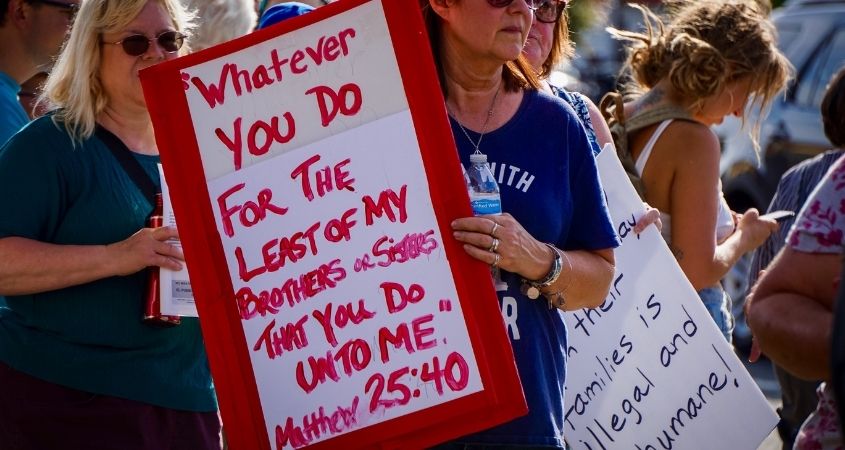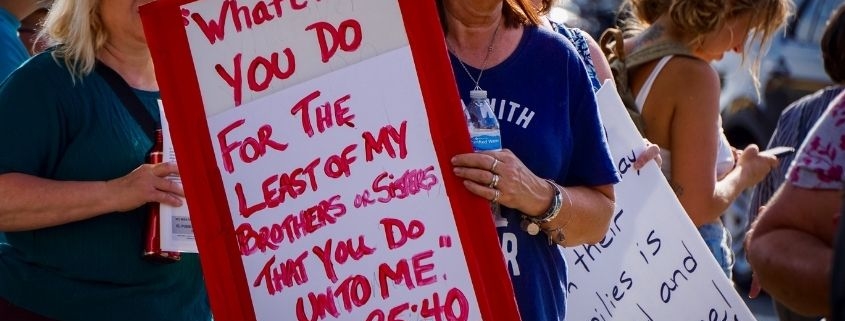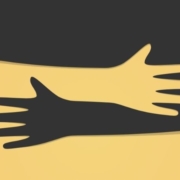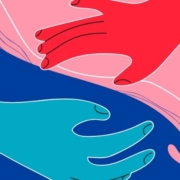Day 6: Imago Dei, the Image of God
BY ANNIE SELAK, PH.D. | March 7, 2022
Today’s Readings
Matthew 25 is perhaps one of the most well known gospel passages in service and justice work. Jesus tells us the key to inheriting eternal life: by feeding the hungry, giving drink to the thirsty, welcoming the stranger, clothing the naked, caring for the ill, and visiting the imprisoned. Jesus proclaims, “Whatever you did for one of the least brothers of mine, you did for me.”
This line, as beautiful as it is, also makes me really nervous. If I were writing this reflection for any group other than the Ignatian Solidarity Network, I might write a beautiful reflection on living lives of solidarity and engaging in these works of mercy. My hunch is that if you are reading the Lenten reflections on “Harden Not Your Hearts,” you already know that this work of justice is essential. Instead, I invite you to consider how interpretation of today’s Gospel can risk turning the people we are serving into objects.

Let me explain: I think there is a tendency to romanticize the poor. Recently I saw a person who is unhoused shivering on the side of the road. I pulled over, went to a coffee shop, and bought him coffee. And because I am a theologian, Matthew 25 started running through my head. Here I was, being a great Christian and giving drink to the thirsty, recognizing that Christ was present in this person. And just like that, I had failed to see this person as a person and instead turned him into a game piece on my path to eternal life.
The work of service and justice is crucial in our faith, but we harden our hearts if we turn others into objects. People are images of God, imago dei. We cannot turn others into objects on our path to salvation while recognizing their own dignity. People are never a means to an end, but always ends in themselves. As we continue on this Lenten journey, I invite you to consider how we recognize the dignity of others in our common work of justice.
For Reflection:
- When I engage in service and justice work, how am I regarding those who I am serving?
- In what ways is my heart hardened towards others? How can I encounter others as full persons, and not a means to an end?
Annie Selak, Ph.D., is a Catholic feminist theologian who researches racism and sexism in the Roman Catholic Church in the United States. She serves as the associate director of the Georgetown University Women’s Center.









Today’s reflection really made me think. Although I am in contact with the poor. Do I really see them as people?
With gratitude for your reflection. Your prayer full words call me to see the path as a path of salvation , a path in which each person expresses grace.
we are speaking of the same sort of phenomenon I have noticed in the health care profession when we refer to “the appendicitis in room 323”, or “”the MI in 365”. The disenfranchised become “the illegal immigrant” or the “beggar on the ramp to the freeway”. The identifying characteristic of a person becomes the issue we first see and we lose sight of their personhood in God. Then our service becomes about us and our good deed instead of the person we are serving. I think this is such an important distinction. Thank you.
As a worker in IVC, my service gives me person to person time together with vulnerable people on the margins , those with chronic mental illness.
Lately I’ve been struggling with the terms “them” or “these people”, even “their” . I try to remember to pray before my work , and hope that I can be authentic in honoring our mutual humanity and status as beloved children.
When I engage in service and justice work, how am I regarding those who I am serving? This is such a great question as the service comes upon us rather quickly at times so our pattern of reaching out to people needs to be established. I would like to say that I am compassionate and kind. I do believe that most of the time I am but like other issues I sometimes slip. I might be in a hurry or think I have other things that need to get done.I do really focus on the person and their needs and put all other distractions to the side. At this particular moment, the face of God is right in front of me and though the person might need food, I try to focus on the needs that come from deep down inside and what I can do to alleviate that deeper pain as I go about my daily work. Most of the people respond by letting me know their vulnerability and I look at that as seeing the goodness of God. Today, I will try to look beyond just the obvious need and respond to each person’s need at the time.
Thank you for digging deeper and challenging me to think. I had not examined where my actions come from. Reflecting on this I can see that I do serve far too often from “I should do this” instead of “this person is hungry/tired/frustrated/in need of love.”
Not feeling purely altruistic on occasions for generosity is satan’s way of dividing us against ourselves, especially when we try to participate in God’s work. If I wait for 100% pure motivation to do something good for someone else, isn’t that like trying to be God?
Makes me think of the paradoxical commandments. We live in screwed up world. I pray that, despite evil or probably more because of it, that God will help us be kind, generous, forgiving, compassionate. Do right and give the consequences to God.
It seems today that 1 does something to help someone or performs an active kindness, this almost instantaneously becomes a Facebook Post. Acts of kindness, to be true human kindness, must maintain the dignity of the person. When we realize that person’s right to privacy,, that person’s right to not become a pawn in the game of “Get to Heaven”; only than will we be able to truly serve another.
Ask them their name. They cannot be anyone else but who they are named if we look at them in this caring way.
Well said. Thank you.
What a beautiful reflection. The author helped me to strip away that next layer of not seeing the person.
Thank you, Annie, for this reflection. It has caused some reflection time of my own and probably will come back to me throughout the day. It is humbling to read how you seem to have taken yourself to task for helping the “unhoused” person shivering on the side of the road.” That might have been a tap on your heart to go deeper with such kindnesses as you did for that person but I wonder if you are aware how much overall good you did not only for that person but for those who saw your love in action. I try to look at certain situations that involve others whose appearances or “situations” etc. might elicit an outpouring of opinion and say to myself that that person too is a child of God-made in His image. That really helps to stop right there with entering into making that person a “game piece.” Sometimes things come up so fast that only later do we think about why we came to help someone out in the way we did.
An overt treatment by another of attempting to show judgment or superiority in opinion is felt harshly but a smile, a cup of coffee or tea, a cookie etc. goes far indeed. Right now I am thinking of the harm done via social media vs. being present to the “other” in love and understanding.
The thing here is that you don’t know how that person on the side of the road was thankful of your gesture overall. Perhaps they went to prayer for your kindness. Perhaps you inspired others to do likewise as you did in bringing that person coffee and in stopping and going out of your way to do so. Even bringing this topic up in your reflection brings many to prayer and service. If your reasoning wasn’t the perfect reason it seems it most likely did a lot of good. Sometimes we are just too hard on ourselves. The kindnesses I have seen of others throughout my life has greatly affected me in how I respond to various situations.
I grew up in a family of 9 with a lot of hard times. We had wonderful parents who somehow did not let us focus on “not having” but on hard work, hard studying, charity to others, and most of all faith. One does not forget kindnesses extended to them in their lives that bring them forward in life-sometimes as simple as a cup of coffee or a smile.
If we do a kindness because someone is noticing we are only fooling ourselves. God sees it all as we all know. Your reflection has caused me to think of those in my past who did small acts of kindness for me and for our family whose influence helped me to do likewise for others.
At times do we look at “that person” or “that situation” in not the most kind way we could? We pray and we do the best we can and give it to God. He knows our hearts and all we have to do is be open to receive Him in receiving others.
At present I find myself thinking about how I can affect the lives of the unborn and those women who are carrying them in the womb. That is difficult but not impossible. It’s just a different approach to another injustice that comes at life. We have to support those birth mothers and birth fathers in whatever way is needed. We have to support the unborn. In doing this we show gratitude to God for the gift of life. Matthew 25 very much fits into that too. Our life is not about us.
Thank you, again, for this nice reflection. Elaine
Thank you Dr. Selak for the challenge to look at the ways my heart is hard. What am I afraid of when I encounter the dementia community my father-in-law is part of? Is it that I see myself in their faces – and that I am afraid? Perhaps.
Sometimes, in acts of mercy, I may have certain expectations….or preconceived ideas about those I wish to serve. In reality, how anyone responds is not important. It is imperative that I become humble before anyone I may serve. Radical mercy and hospitality is what I am called to….giving thanks for the chance to serve this person God has placed in my life.
This may be petty but why always assume someone would appreciate coffee? It’s a diuretic and if I were homeless, an oft preoccupation would also be the location of nearby bathroom facilities. Also, I detest coffee and I’m sure that there are others who would welcome a kind gesture, just not that particular choice.
Wow – this is enough to paralyze one in one’s efforts to see God in each other. How do you not over-think every act of kindness or step toward solidarity?
If you felt guilty for presuming the cold man needed a cup of hot coffee, what should you have done instead of that? How should one consider a cold person more compassionately? Should you have asked him about himself and his situation first instead of presuming he needed hot coffee? I remember Jesus asking a man begging for mercy, “What do you want me to do for you?” Is this how one should act instead of presuming that coffee would be helpful?
I admit I used to see someone begging outside a supermarket and go in and buy some lunch for him. But I’ve since discovered that it is better just to sit down beside them, introduce myself and listen to them. That way the person becomes real, has a name, and can be lifted up in ongoing prayer. Making eye contact and smiling helps to brighten everyone’s day.
Many thanks. Indeed human beings are made in the image and likeness of the divine – declare scriptures in different religions and cultures.